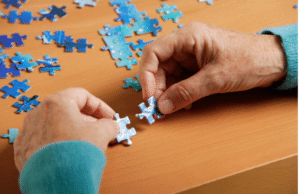
As people get older, their cognitive abilities decline which often leads to the development of severe medical conditions. One of these is dementia which generally refers to the disruption of memory, language, thinking and problem-solving skills that affect daily life.
According to statistics, about 50 million people suffer from dementia worldwide and most of them include seniors. In fact, this medical condition is regarded as one of the main causes of disability and dependency among older people whose cognitive functions deteriorate as they age.
This can be very overwhelming for the people who suffer from it as well as for their families and caregivers. And while special therapies and supplements may help manage the symptoms of dementia, mentally stimulating activities have proven to be beneficial too.
Jigsaw puzzles for adults are one of the many brain-stimulating activities recommended to maintain cognitive health and make coping with dementia symptoms much easier. Here are six ways how solving puzzles can help cognitively-impaired seniors.
Improve brain health
Dementia is caused by damage to the brain cells which disrupts their communication leading to the impairment of different functions necessary to perform daily tasks. One way of improving brain health and people’s cognitive functions is to engage in mental-stimulating activities such as jigsaw puzzles.
When solving a puzzle, people activate both sides of the brain at once. The left side of the brain is the center for logic and order, while the right side is responsible for stimulating creativity and intuition. When both sides work together, it stimulates brain health as a result of the connection between brain cells, providing a good mental workout.
In addition, the simultaneous work of both sides of the brain further aids in the recognition of shapes and colors and problem-solving skills.
Enhance memory skills
One of the major symptoms of dementia includes problems with memory skills. While lack of memory is often overlooked in the early stages of dementia, it gradually progresses as people age and they become more forgetful of recent events and even people’s names.
Jigsaw puzzles help enhance memory skills by reinforcing the connections between brain cells which results in improved mental speed and short-term memory. When solving a puzzle, seniors are expected to recognize and remember different colors, patterns and shapes in order to put the pieces in the right place.
Therefore, remembering the image of the puzzles is a great way for dementia patients to strengthen their memory skills which will further help them in the memorization of familiar places, things and activities.
Better visual-spatial skills
Alzheimer’s disease is one of the most common causes of dementia accounting for about 60-80% of all cases. Such patients often have problems getting lost in familiar places, finding the right words to identify objects and express thoughts.
Therefore, by solving jigsaw puzzles, not only will patients be able to improve their memory skills, but also their visual-spatial abilities.
When solving a puzzle, people are expected to look at individual pieces and figure out where they belong in the big picture. They search for specific shapes, colors and patterns of the puzzle which will help them determine how the pieces connect together.
By enhancing their visual-spatial skills, dementia patients will be able to perform other activities as well such as using a map, learning and even dancing.
Reduce stress levels
As dementia progresses, seniors often become more agitated which can be difficult for their families and caregivers to manage. To make things easier for such patients and the people around them, jigsaw puzzles are a great way to release tension and provide calming effects. The Newverest jigsaw puzzle mat roll up is an excellent solution, allowing caregivers to easily store and manage puzzles while maintaining a stress-free environment for the patient.
By solving a puzzle, people exercise both sides of the brain which results in calming people who get agitated and brings them a sense of focus if they are restless. In other words, the search for the pieces to fit the puzzle requires concentration. And the focus on this activity will instantly bring relaxation and happiness.
In addition, the cardiovascular system will function better and breathing and heart rates will be slowed down.
Offer increased social interaction
Unfortunately, dementia is sometimes associated with a sense of loneliness causing patients to feel as if they are separated from the rest. They may also have trouble interacting with the people around them. Besides being a great activity to stimulate the brain in many ways, jigsaw puzzles can also help bring people together.
When seniors engage in solving a jigsaw puzzle, they have the opportunity to spend time together and communicate with each other. Such social interaction will undoubtedly increase their people skills as well as encourage their collaboration in solving a puzzle. They will be helping each other by finding the right pieces which will result in a sense of shared accomplishment when they solve the puzzle together.
Improve mood
Unfortunately, dementia cannot be fully treated, but it can be managed in order to alleviate the symptoms, making daily living more bearable and performing tasks much easier. And since most changes in the brain are permanent and even worsen over time, dementia patients often suffer from depression which affects their mood.
When solving a puzzle, the brain produces a chemical known as dopamine. This neurotransmitter is responsible for regulating the mood which is enhanced when a dementia patient successfully completes a puzzle. In other words, every time a patient puts a puzzle piece in the right place, dopamine is released. This sense of accomplishment certainly improves the overall mood.
In addition to this, the release of dopamine also affects learning, concentration and motivation.

Final Thoughts
Keeping the brain active while suffering from dementia can certainly delay symptoms of such brain disorders. While medications are required for treating this medical condition, mental-stimulating activities such as jigsaw puzzles can also be very beneficial in the process. They keep the mind active by engaging it in problem-solving tasks such as finding the right piece to fit into the puzzle further resulting in improved socialization, cognitive functions and most importantly general health. So if you know someone who suffers from dementia, you can help them cope with this condition with a fun jigsaw puzzle.